Does the future of journalism exclude the older generation?
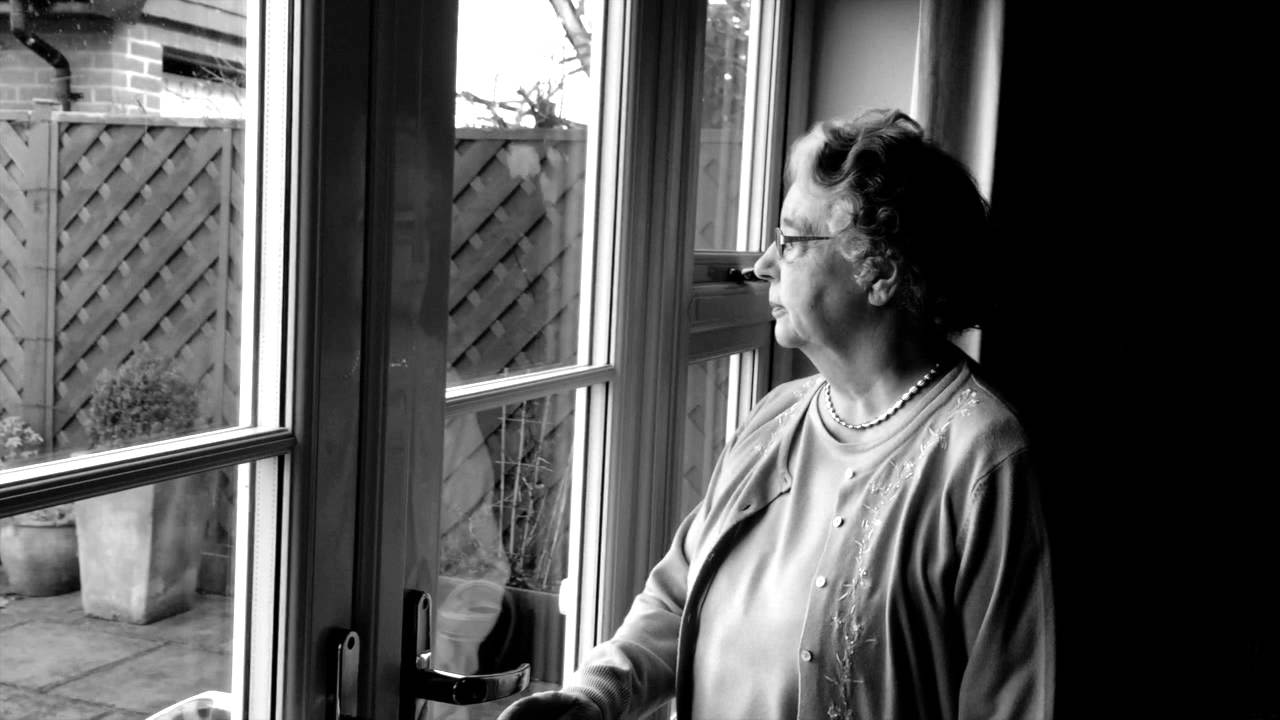
"Slowly but surely, the local fabric of our communities is being eroded by things like the decline of local newspapers, which older people rely heavily on as a source of information and communication...I see first-hand that these issues are contributing to feelings of isolation."
- Nyree Ambarchian, a volunteer with Contact the Elderly.
Ofcom's 2019 report News Consumption in the UK revealed that over 65s are the highest users of newspapers, with 58% reporting they do. However, since 2005, at least 265 local papers have ceased producing their print editions.
Ofcom also reported on news consumption via the internet in the UK, with two-thirds (66%) of all adults stating they access news over the internet, in comparison to only two-fifths of over 65s (40%).
Are new mediums like social media platforms and news websites less accessible, or does the unfortunate inevitability of getting old mean falling behind the times?
The Facts
What is the future of journalism?
In 1476, William Caxton set up the first English printing press. The majority of the population at this time were illiterate and relied on town criers for their news briefing.
When literacy in society increased, the demand for newspapers did too. The public could access news themselves. Eventually, the radio newsreader appeared. The invention of television presented yet another way to access news, nationally and locally.
Journalism has evolved considerably since. Two taps on a smartphone to access news from around the world, with minute-by-minute updates. Nevertheless, journalism and how we access news will continue to evolve beyond any expectations or stretch of the imagination. The truth is that there is no crystal ball to tell us what the future of journalism is. One can only speculate based on current trends.
The way we consume news today is dictated heavily by the technology available. Over recent years, newspaper circulation has declined. According to Ofcom, "Circulation of national newspaper titles has decreased from nearly 22 million in 2010 to 10.4 million in 2018."
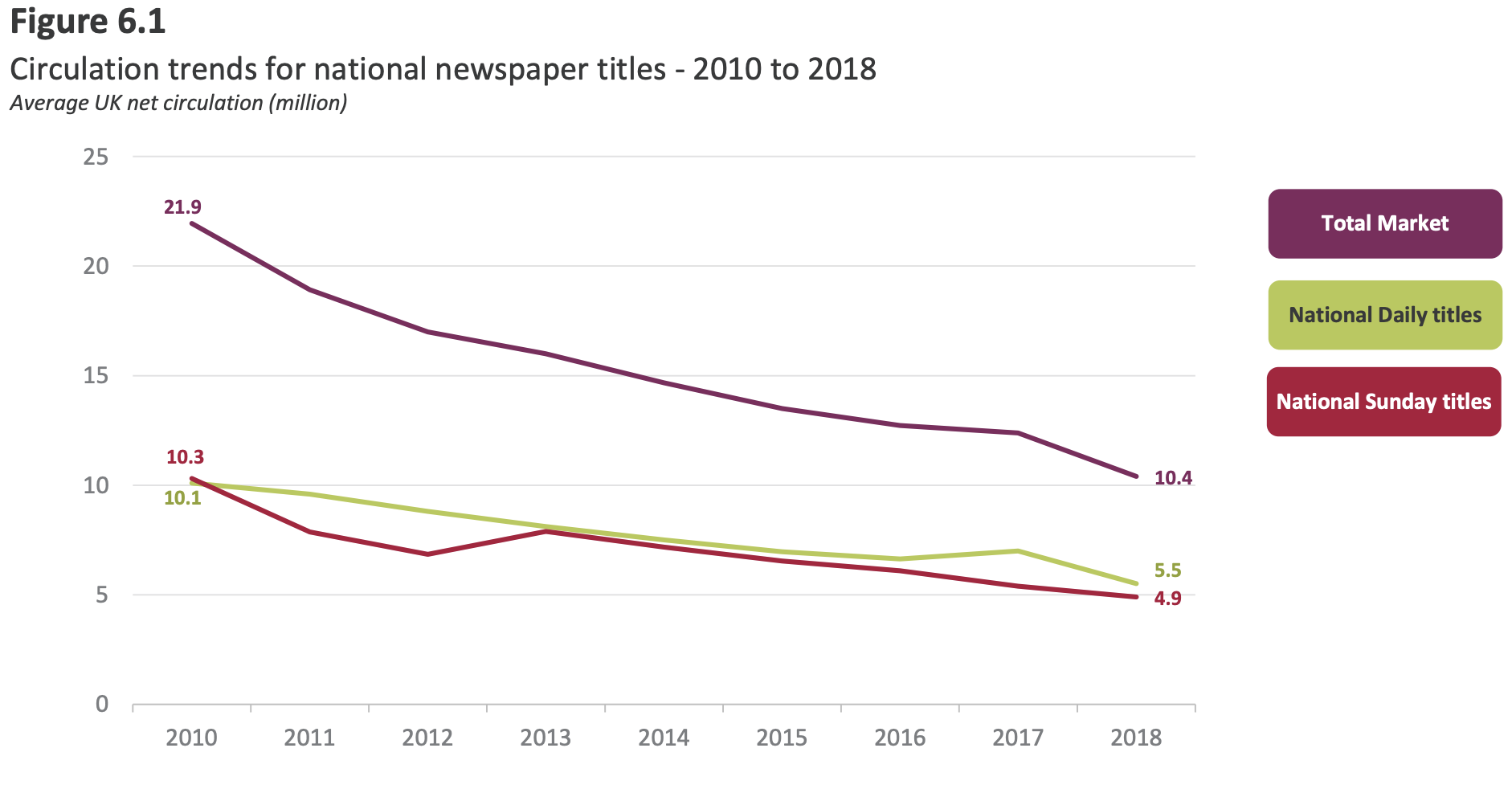
Source - Ofcom
Source - Ofcom
The root cause of this epic decline - a definite halving over eight years - is mostly financial. The public does not buy as many newspapers, so advertisers turn to other platforms where their work will reach a wider audience. Newspaper companies, therefore, cannot justify spending as much as they once did on unsustainable print editions.
The Independent became the first national newspaper to embrace a digital-only future. The owner of The Independent, Evgeny Lebedev, said: "The newspaper industry is changing, and that change is being driven by readers. They're showing us that the future is digital."
Steve Auckland, The Group CEO of ESI Media (publishing owners of The Independent) said: "We now have a clear and secure future path for our businesses. It's also a further opportunity for our advertisers to capitalise on our growing, smart, affluent and digitally savvy audience."
Revenue has almost doubled since The Independent closed its print operation four years ago, in March 2016.
Will other news corporations follow in The Independent's footsteps recreate this success, and leave their print editions behind?
Still going strong, despite the surge in online news, is television. As of 2019, 75% of UK adults consume their news through television; a 4% drop from 2018. Perhaps unsurprisingly, that statistic includes 94% of over 65s.
Source - Ofcom
Source - Ofcom
BBC One continues to dominate the market, with 76% of those consuming news via television, tuning into the channel. TV Licences are now no longer free for everyone over the age of 75. As of August 2020, only over 75s receiving Pension Credit will be eligible to apply for a free TV Licence. Elderly members of our society who do not receive any pension credit will have to fork out £157.50 every year.
Scanning through a newspaper for something of interest is far less convenient than checking a mobile device. News applications like Apple News even send notifications of the day's headlines. Most platforms create a 'filter bubble' for the user based on what they have interacted with previously. Mobile devices offer news of interest to the reader, which is easier to access, more up to date and more interactive. Unsurprisingly, the UK is interacting with newspapers less, and online platforms more.
Sources of News in the UK - Reuter's Institute
Sources of News in the UK - Reuter's Institute
Accessing news online is on the rise. Current trends show we are leaving our physical print newspapers behind and relying more and more on social media and the internet. However, 53% of those aged seventy-five and over are not regular internet users.

The Independent's first and final print edition
The Independent's first and final print edition
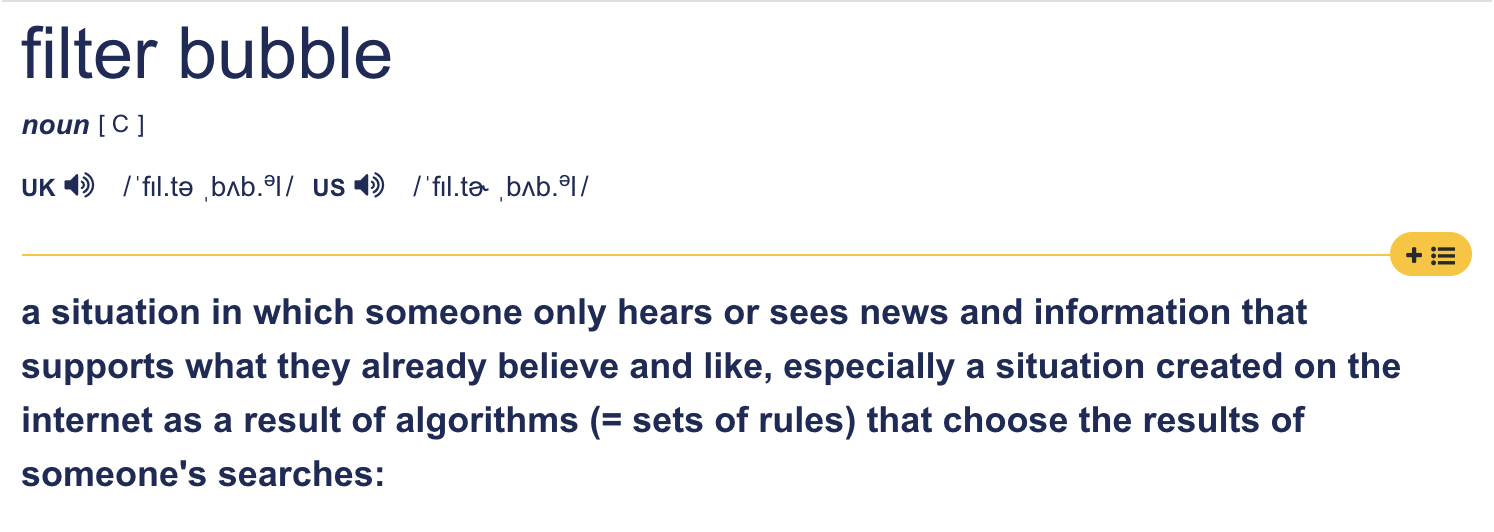
Source - Cambridge Dictionary
Source - Cambridge Dictionary

Apple News Interface
Apple News Interface
Tragedy in Harlow
Robert Halfon, the MP for Harlow in Essex, said elderly constituents are calling his office for news after their last local paper closed its print edition.
The Harlow Star released its last print edition in January of 2019. Halfon described this as "cutting an important thread holding the local community together."
"People are completely isolated," Mr Halfon said,
"Especially if they're elderly, they've no idea what's going on, what's happening to the hospital, what the council are deciding, what the schools are doing, what their grandchildren are doing."
The Harlow Star is still available online, but as Mr Halfon explains, "you have to be online to look at it".
The Harlow Star is just one of 33 local paper closures since January of 2019, bringing the total to 265 since 2005.
Final Print Edition of The Harlow Star
Final Print Edition of The Harlow Star
Douglas & Cynthia
The Office for National Statistics reported 2.9 million of those over seventy stated their mental health had been affected by the coronavirus pandemic. That equates to over two-fifths of those over seventy.
Unfortunately, Douglas and Cynthia Chapman have, like millions of older people this past year, become increasingly more isolated. They have been using applications such as WhatsApp and Skype to keep in touch with their family.
"Without technology there would be a complete cut off," Douglas said, "at least the images of our family are available."
"I've embraced it, I was unwilling at first... but I've embraced it and I think that I'm more or less abreast of it, I understand the various forms of transmission, what we're able to do over WiFi and Bluetooth."
Douglas spent the bulk of his working life in electrical engineering; however, "using computers to aid my work was only in its infancy when I was working in the field."
Douglas, at eighty-four years of age, is now computer literate, "I do make use of it, in the sense of writing and observing and gleaning information from sources when I'm not able to answer the questions myself."
Douglas recently upgraded to a smartphone, which has "probably got more gizmos than I'll ever use, but nevertheless, changing my phone was mostly because I wanted a larger screen with greater definition, and my old one did not have a loudspeaker facility whereas this one does."
Cynthia, on the other hand, does not have as much confidence in using technology. She does use her desktop computer "for emails and to play FreeCell." She explained her mobile phone sits "in my bag for when I go out, should I need it, but not so much now because Douglas doesn't drive, he's always with me."
"My two grandchildren I speak to on my mobile because they're away at university, and my daughter, I speak to her on that, but I can get them on my ordinary phone, which I prefer. It's easier to hold."
A contributing factor to Cynthia's lack of confidence in technology is her fear of being scammed. Understandably so, as in the UK, every 40 seconds an older person becomes a victim of fraud.
She explained her cautiousness and the steps she takes to keep herself safe online, "Well, I'm very careful, I don't open anything I don't know, I just delete it, and if I'm not sure, I always ask Douglas."
When asked if she knows of anyone her age who is at risk of being scammed, Cynthia explained, "(They) don't have any technology anymore, they've got rid of their computers... they don't have a mobile phone, and I think that's pretty common for people my age."
"I think technology has improved the world to a certain extent, but it's also provided a lot of nasty ways, which I wouldn't even consider getting involved with."
Douglas occasionally checks the news on his new mobile phone, but mostly the two watch the news on television. "When we're having our cup of tea in bed in the morning at half-past six, on goes the TV. When we're having our lunch we sometimes have the news on, just to catch up with what's going on."
They both read The Times and The Daily Mail newspapers.
Cynthia likes "to read all the little bits and pieces, and the different people that specialise each week, like Amanda Platell, she's really funny and she's quite plain-speaking, shall we say."
Their neighbour delivers their local paper, The Suffolk Free Press, each week. "I do read it from cover to cover," Cynthia explained, "We used to have one delivered every day. There were perhaps days when you wouldn't look at it at all, then they'd pile up and end up in the bin."
For Douglas, reading newspapers "is becoming less of an interest due to my failing eyesight, so consequently, I scan rather than read intently."
"If the article from its headline suits me, then I'll read on, but otherwise I don't go into every article I see in the newspaper."
Despite embracing technology into their lives, Douglas and Cynthia still cannot access local news like they used to. The coronavirus pandemic has meant the couple do not socialise with friends as they once did. Now the couple is forced to rely on television to let them know what is going on around them.
At the cost of £157.50 a year for the privilege.
Image by David Chapman
The Digital Divide
After figuring out a new piece of technology, something more advanced comes along. Those who cannot keep up, get left behind—an unavoidable consequence of this constant evolution. As the older population pass, will those who grew up in the digital age move better with the times?
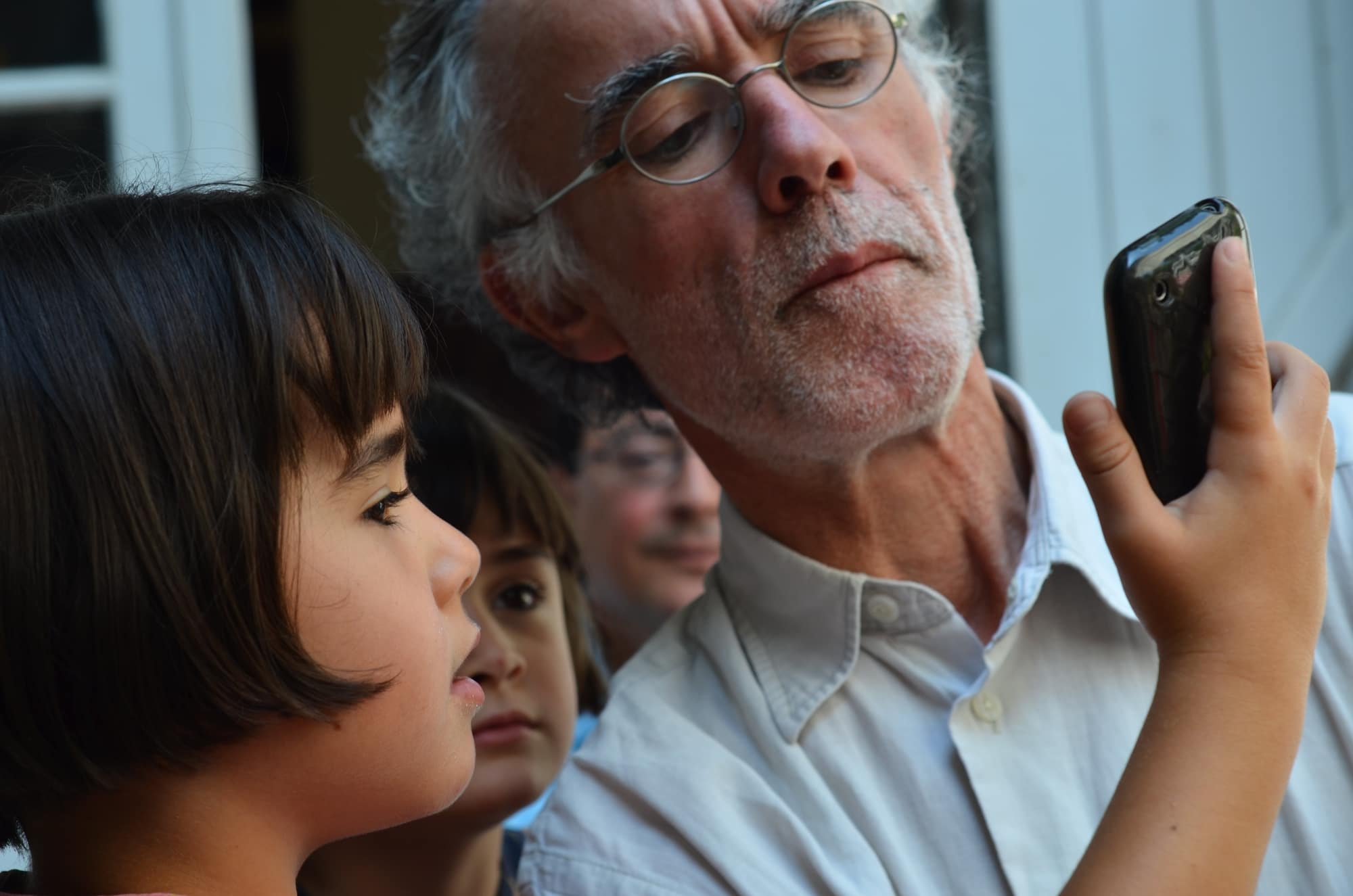
ONS' 2019 report states 29% of adults over 65 have never used the internet, compared to 4% of those aged 16-64.
Those in the education system today learn how to use various smart devices throughout their curriculums. Young people also use smart devices in their personal lives. According to YouGov, four in ten British children own a tablet by the age of six.
Another slightly older generation grew up without the internet in their daily lives. However, they were at a receptive age when the internet became more prevalent, and that meant they could adopt and embrace new developments. Others had to adopt the use of technology as a part of their careers.
A large proportion of the older generation, specifically the retired, have never had modern technology as a part of their life; until now.
If the digital divide was not isolating enough, the coronavirus pandemic dealt the final blow. During the lockdown, the Great British public was instructed only to venture outside for essentials and limit social contact.
Currently conducting a study into the impact of lockdown on the elderly, Dr Kathryn Martin from The University of Aberdeen knew how devastating the impact on the older generation would be:
"It is widely recognised that prolonged home confinement is likely to have a far greater impact on older people, particularly in terms of loneliness and reduced physical activity, leading to increased frailty."
Elderly loved ones found ways to socialise when the population could not physically meet. Applications like FaceTime, WhatsApp and Zoom have seen a record usage increase during the pandemic. Ofcom reported the over 65s who video-call once a week increased from 22% in February to 61% in May. Video calling is perhaps the closest one can get to physically meeting and is a significant weapon in the fight against loneliness. However, socialising in this way was exclusive to those with internet access and devices capable of video calling.
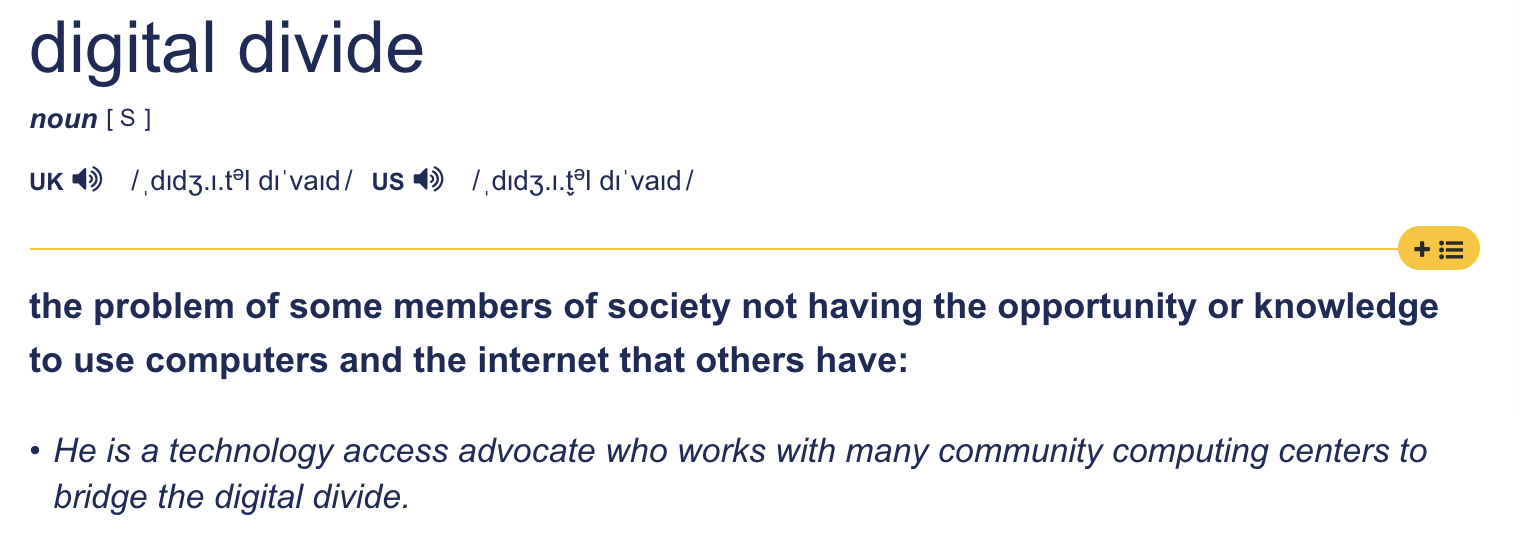
Definition - Cambridge Dictionary
Definition - Cambridge Dictionary
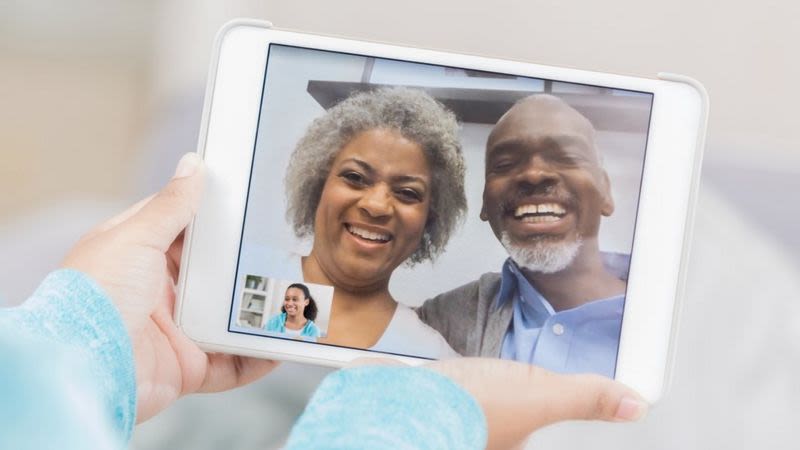
Image - Getty Images / BBC
Image - Getty Images / BBC
Conversely, not everyone wishes to participate in the online world. According to an Ofcom report from 2016, 93% of non-internet-users aged 65 and over have no intention to use the internet. This statistic could suggest that this is a 'now' issue, in that it will no longer be a problem when the older generation pass. Everyone will already be or want to be online. As a society, we can only help seniors who want to get online. Based on current trends, the future of journalism will not include those who refuse to move with the times.
On the other hand, whatever the future may bring technology-wise, there could be another 93% of non-users who have no intention to use it. The older generation was at the cutting-edge of the technological developments in their time. But, the invention of the telephone meant nothing to those who preferred to write letters. Radio listeners may not have wanted to transition to television. By 2037, one in four of the population will be over 65, and even though a large portion of that group now is digitally literate, they may not be in the future.
Then again, is this a fair comparison to make? Being a digitally literate person now may mean that new technology will be easier to understand and adopt in the future.
The digital divide as a problem may not disappear with time, and instead, present itself differently.
For those who do intend to get online, there are training courses available to the elderly nationwide. Some charitable organisations and local library projects offer IT training courses.
Age UK is one of those organisations. Across the nation, Age UK run 'Digital drop-in sessions'. Older people can build on their digital knowledge, and learn how to optimise their use of technology. Age UK Leeds are one such branch. A video on Age UK's YouTube channel explains what happens in these sessions, what Digital Champions do, and includes positive feedback from the elderly who participate.
Age UK Leeds, despite the pandemic, are still offering their support to those who need it. As discussed earlier, the older generation welcomed video calling to keep in contact with loved ones over the past year. With the possibility of an isolated Christmas approaching, being able to connect with friends and family through technology is vital.
During the pandemic @AgeUKLeeds has continued to offer digital support to older people. One gentleman said 'your volunteer helped me use my tablet for video calling and now I can contact my family and see their faces' #togetherleeds
— Forum Central (@MyForumCentral) September 29, 2020
Unfortunately, Age UK do not provide these services at all of their branches. Furthermore, Age UK has closed some of their branches. Age UK Suffolk has ceased operating due to financial losses, exacerbated by the coronavirus pandemic. Age UK was contacted but declined to interview.
Fortunately, Age UK is not the only option for our digitally keen elders.
The Online Centres Network is responsible for 'the UK's largest digital inclusion campaign' - Get Online Week. This year, due to the pandemic, the organisation has not been able to host the events they ordinarily would. Instead, the 5,000 grassroots organisations offered their support over the phone, over video calls, or in-person if safe to do so.
The digital divide can be bridged, and our loved ones can get online, safely, if they want to.
The Responsibility of Publishers and Public Service Broadcasters
Is it the responsibility of news corporations and publishers cater to all demographics?
The BBC is a public service broadcaster, which the public pays for through TV Licences. According to Ofcom,
"Public service broadcasting (PSB) has a long and proud tradition in the UK, delivering impartial and trusted news, UK-originated programmes and distinctive content."
The entirety of the BBC falls under this umbrella, whereas Channel 3, Channel 4 and Channel 5 services only reach PSB status through their main channels.
As a public service, it would be fair to assume that the content and the service they provide is accessible by all. However, accessibility functions, such as larger text and a read-aloud function, prove a challenge to locate.
The Age UK website features a read-aloud function at the top of each article, allowing users to hear the text if they experience trouble reading. Users can pause, rewind and change the tempo and volume.
Age UK's read-aloud function
As Age UK is a registered charity that supports the elderly, their website will inevitably be far more accessible to the older generation than most other websites. Assuming news websites are also used by the elderly and are a 'public service', why are they not as accessible?
The ITV News website does not have any accessibility functions available on the landing page. Channel 4 News' landing page does, but the word 'accessibility' appears in an almost indecipherable text at the very bottom of the webpage. How are those that require accessibility functions going to be able to locate it?

Channel 4 News' accessibility function
Channel 4 News' accessibility function
Once users follow the hyperlinked text, the following statement appears:
"Channel 4 is committed to accessibility and making our content accessible to the widest possible audience, regardless of disability, capability or technology."
"Channel 4 is committed to accessibility and making our content accessible to the widest possible audience, regardless of disability, capability or technology."
However, users cannot change the size of the text on their news website, and there is no read-aloud function.
Unlike the BBC, ITV and Channel 4 have shareholders to please and profits to make. BBC channels do not feature any external advertisements, whereas companies could be paying up to £62,410 (Correct as of Nov 2020) for a single thirty-second commercial slot on ITV. The same is true for other news corporations, such as Sky News. Turning a profit is more of a priority than catering their content to all demographics.
Accessibility should be paramount to PSBs, as the public pay for their service. It is rather unfair that the older generation pumped money into these PSBs over their lifetime and now cannot access all of their content. Additionally, a number of over 75s no longer receive a free TV Licence, meaning they are paying when perhaps they did not before. Now that the most up-to-date news is online, the older generation cannot necessarily access it; it begs the question of whether news corporations are gatekeeping their best content.
It may be that it is more financially viable for these profit turning companies to appeal to a specific demographic. Catering for everyone would mean investing unnecessarily in a venture that may not return any revenue. It is, however, impressive when a company can do it.
After coronavirus hit the UK and national lockdowns restricted its community, The Yorkshire Post launched a new initiative, which is funded by Barclays, to deliver free newspapers to members of their community.
"25,000 newspapers will find their way into the homes and hands of people who otherwise would have gone through lockdown with little contact with anyone else, and with nothing like the same level of information from local radio or television."
James Mitchinson, the editor of The Yorkshire Post, explained: "it was obvious to all of us here at The Yorkshire Post that the provision of information – trustworthy, unsensationalised and, above all, locally relevant – had never been more important."
He also described how the newspaper "is one of the few remaining channels to access that information – not least for readers who could not afford to have broadband on tap."
"We take our responsibility to the people of Yorkshire seriously and we value more than is sometimes realised the relationships we have with our readers and their families."
If a regional paper can make their content accessible to the elderly, then why are the large corporations or PSBs not? The Yorkshire Post has found a way "to help the most needy, deserving and vulnerable in Yorkshire." All without making a financial loss. It leaves no excuse for other companies to exclude demographics.
Perhaps their compassion for their community and charitable projects contributed to The Yorkshire Post being voted Daily Newspaper of the Year in the Regional Press Awards, and the most trusted newspaper in Britain by PAMCo.
News corporations and publishers could be putting all their efforts into being at the cutting edge of journalism, and completely neglecting the needs of specific demographics that use their services. Perhaps they should take a leaf out of The Yorkshire Post's book.
This just happened and I've just cried. You've no idea what this means to me. To us. We don't get massive audiences online for TYP because we do things differently. As well as being a victory for the team I'm privileged to lead, this is a victory for trusted, quality journalism. pic.twitter.com/4BoUJw0Llc
— James Mitchinson (@JayMitchinson) June 19, 2020
Does the future of journalism exclude the older generation?
The future of journalism, if that means the death of newspapers and an upsurge in online sources, will exclude the current older generation if news corporations do not make their content more accessible.
Newspapers such as the Independent, are moving online and profiting from it. Advertisers profit more from advertising online, so newspapers cannot afford to continue. The Independent doubled its revenue over just four years of being exclusively available online.
More local newspapers are suffering, leading to 265 local titles closing their print editions since 2005. The Harlow Star was one of these and now its older readership has resorted to calling the local MP just to know the local news.
Despite almost all of the older non-internet users having no intention to get online, others that are online are embracing technological advancements with open arms. In the wake of national lockdowns, the number of over 65s video calling once a week increased by almost 40%.
Organisations like Age UK and the members of The Online Centres Network are putting every effort into bridging the digital divide and conquering isolation between generations by offering training and support in using technology and the internet.
The Yorkshire Post, knowing how important their content it is to their community, has worked hard to make their content accessible to the older generation. They have given away 25,000 free newspapers to the older, more isolated members of their community.
On the contrary, ITV and Channel 4's news websites are perhaps unusable to anyone who requires accessibility functions, the older generation included.
Free newspapers are not necessarily the answer mind, as people like Douglas struggle to read them. People in a similar position must now rely on television. However, TV Licences, as of August this year, are no longer free to everyone over 75.
One in four of the population will be over 65 in less than 20 years. Unless publishers and public service broadcasters take responsibility and cater to all demographics, the older generation will not be part of the future of journalism and never will be.
Whether this means free TV Licences, investing more in local newspapers or supporting the older generation when they embrace the online world, everyone in the industry should be fighting demographic-based exclusion.










